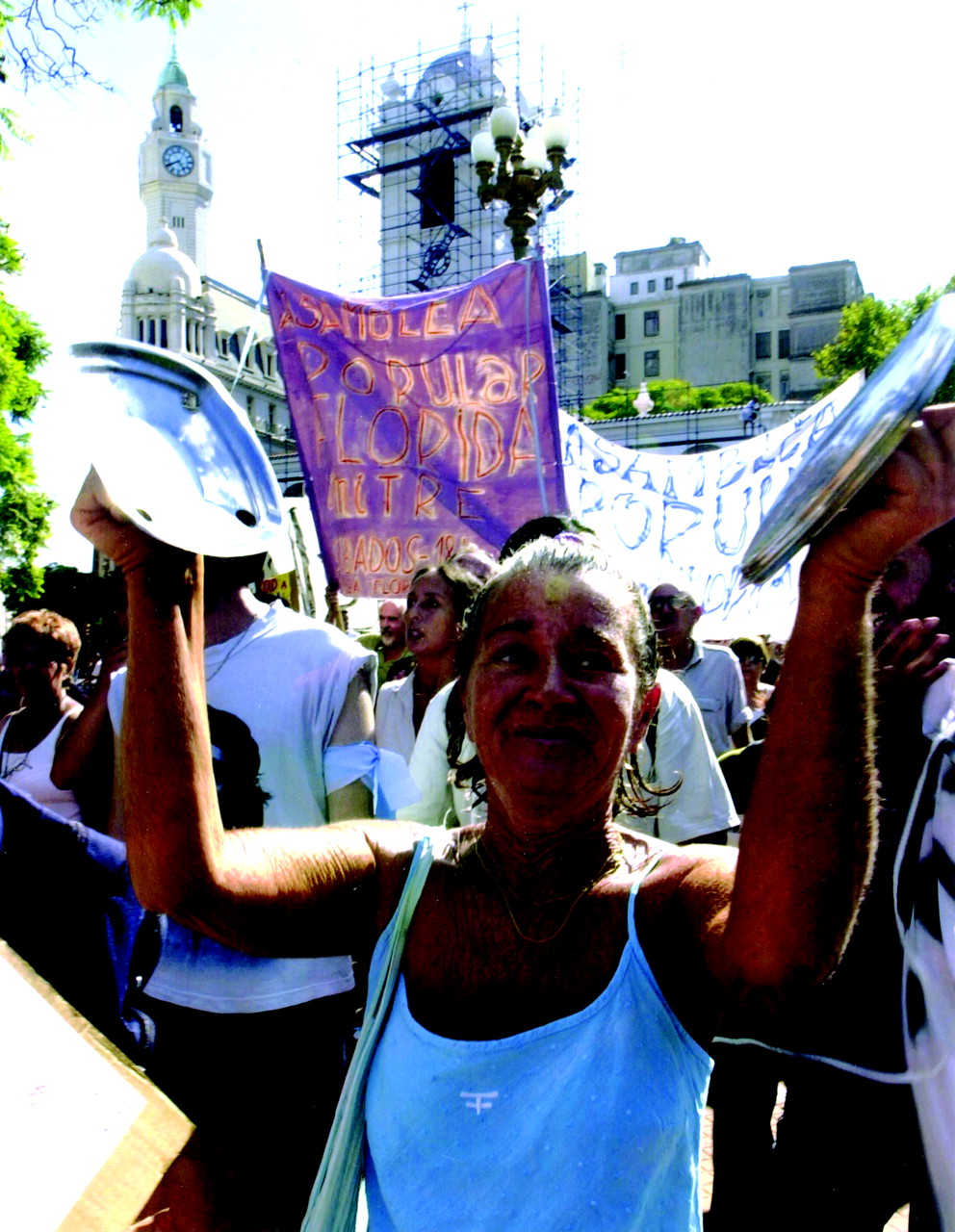As Argentina’s Economy Crumbles, Psychiatrists Try to Ease the Pain

Argentines bang pots and pans in Buenos Aires’s Plaza de Mayo to express their rage and frustration over Argentina’s economic crisis.
During the past several years, however, Argentina has been swept up into an economic maelstrom that many Argentines consider not just their worst in recent history, but perhaps ever. The crisis in turn is decimating Argentines’ incomes. Last year, a run on the banks wiped out more than $17 billion—a quarter of all bank deposits—in just a few months. So in December, the government imposed a limit on the amount of money that Argentines could withdraw from their bank accounts to 1,200 pesos a month, about $1,000. It was called “La corralito,” or “small corralling.” In January the peso was devalued in relationship to the dollar. That meant that Argentines lost some 50 percent of the value of their bank savings. In March unemployment was heading toward 30 percent, with millions jobless. And of those who had jobs, many had not gotten their salaries for months.
Moreover, the situation has become so dire that many Argentines are trying to flee the country. Victoria Hendrick, M.D., a Los Angeles psychiatrist, told Psychiatric News, “My family members in Argentina are making arrangements to emigrate to Italy. It’s ironic that my ancestors left Italy four generations ago to move to Argentina, and now the family is returning to Italy.”
Pain Is Also Psychological
The pain that the current economic crisis is inflicting on Argentines goes way beyond their pocketbooks. It is afflicting their psyches as well, although, as Eduardo Val, M.D., a San Diego psychiatrist from Argentina, pointed out, “Argentina has always been a country with a lot of uncertainty. That is its national character. If you listen to a tango, there is always a drama going on.”

Unemployed Argentines carry sticks as they confront police during a demonstration about the economic crisis.
And then there is the anxiety, which is heightened by the fact that none of the politicians running for office seems to have any good ideas about how to solve the country’s economic crisis.
“You can imagine all the anxieties that a group feels when it is left without a leader,” Ana Maria Batiatta, a Buenos Aires psychologist, said in an interview.
“Some patients who were released months or years ago have had a relapse of their symptoms, especially those with general anxiety disorder, panic disorder, or posttraumatic stress disorder,” Alfredo Cia, M.D., a Buenos Aires psychiatrist, told Psychiatric News. Many people, he added, “feel constantly threatened by future calamities, even worse than the ones they are already suffering. Sometimes their symptoms are similar to those of PTSD, although not identical with them. A provisional name for the phenomenon they are experiencing might be called ‘traumatic threat disorder.’ ”
What’s more, there is the demoralization that Argentines feel at work. “People are less motivated than before because of so many layoffs,” Batiatta said, “and those who still have jobs add hours to their already busy schedules, doing the tasks of two or three people, and all for the same salary, if not less.”
Then there are the psychosomatic symptoms provoked by the crisis—the heart attacks, digestive problems, insomnia, hyper-alertness. And also the compulsions and denials.
“Some Argentines cannot tear themselves away from news programs on television or from reading news about the crisis and its consequences,” Cia said. “Still others don’t want to know anything about what is going on.”
Last but not least comes the depression. “Certainly a lot of Argentines are very depressed,” Jorge Schneider, M.D., a Chicago psychiatrist from Argentina, told Psychiatric News. “There is a sense of hopelessness and a sense that there is no future, so I would say there is a sort of societal depression.”
Not surprisingly, this depression and hopelessness are apparently dampening Argentines’ sex lives. Their sexual activity has plummeted dramatically during the past several months, media surveys suggest.
Also, not surprisingly, the pervasive depression and hopelessness are leading to alcohol and drug abuse and even some suicides, Elsa Wolfberg, M.D., president of the prevention psychiatry section of the Argentine Psychiatric Association, noted in a press release issued by the association in March.
Interestingly, however, when the Argentines vent about the economic crisis, it may be distracting them, at least over the short haul, from considering suicide. The reason to believe that this is the case is that during recent street demonstrations in Buenos Aires calls to the suicide hotline dropped dramatically, Juan Carlos Stagnaro, M.D., an adjunct professor of mental health at the University of Buenos Aires, told Psychiatric News.
Difficult to Get Help
In any event, the irony is that while Argentines have a pressing need for psychological help because of the economic crisis, it is hard for them to receive such help because of the crisis. For instance, more and more Argentines with mental health problems are going to public institutions for help because they can no longer afford to visit psychiatrists in private practice, Néstor Koldobsky, M.D., an associate professor of psychiatry at the University of La Plata in La Plata, Argentina, said in an interview.
Yet these public institutions are themselves in a fragile state because of the current crisis, Miguel-Angel Materazzi, M.D., chief executive officer of a Buenos Aires mental hospital for men called Borda Hospital, pointed out. In fact, some Argentines are in such poor financial shape that they can’t even afford to take a bus to public mental hospitals and clinics, Luis Ellerman, M.D., secretary of the Argentine Psychiatric Association, said.
In other words, the current economic crisis, which is devastating Argentines psychologically, is also greatly shackling Argentine psychiatrists’ ability to help them through the crisis. Argentine psychiatrists are deeply concerned about this situation, Ellerman said. As a result, the situation will be a topic of major discussion at the Argentine Psychiatric Association’s spring congress.
Argentine Psychiatrists Try to Help
Nonetheless, Argentine psychiatrists are doing their best to help their fellow citizens psychologically during this extremely difficult time.
“Some Argentine psychiatrists are reducing their fees,” Ellerman reported. “Still others are offering support by phone to patients in crisis or deferring their fees.”
“In my private practice,” Stagnaro explained, “I have patients who have lost their jobs or who have had their incomes greatly decreased. So in these cases I have decided to continue all treatment even when my patients cannot continue to pay, because I believe that my job with them should not be interrupted for ethical as well as therapeutic reasons.”
“Argentine psychiatrists are helping by giving psychotherapy similar to that for reactive depression or for an anxiety crisis that is the product of a traumatic situation,” Pablo Gabay, M.D., a University of Buenos Aires psychiatrist, pointed out.
“Argentine psychiatrists are also trying to help Argentines handle their economically provoked psychological problems with appropriate psychotropic medicines,” Mordechai Benyakar, M.D., a professor of psychiatry at the University of Buenos Aires and Tel Aviv University in Israel, said. The use of antidepressants and antianxiety drugs shot up 300 percent after the peso was devalued in January, he added.
“Whenever the patient’s condition allows, instead of institutionalizing him or her, I arrange a free outpatient treatment plus free medicines to be administered at home,” Materazzi reported. “Also, I have intensified group psychotherapy sessions that take place weekly, not just at my hospital but at a mental hospital for women.”
“Our position,” asserted Manuel Suárez Richards, M.D., chair of psychiatry at the University of La Plata, “is to carry out our same tasks as before and even better than before.”
Rodolfo Fahrer, M.D., Ph.D., chair of mental health at the University of Buenos Aires, agreed: “We need to alleviate as much as possible the anxiety of the population, to keep our fellow citizens from falling into hopelessness, which is doubtless the main danger for them.” ▪



